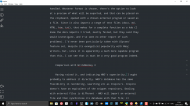I don't have a very good answer
-Dormouse
But now I do
ConvenienceI think this is the core of the attraction. Comparing Evernote and OneNote a decade ago, Evernote was growing rapidly in popularity despite OneNote having many more features, and I think that's because most people found it convenient in a way that OneNote never has been. It did enough, it was simple to use, and was reliable.
The edit screen is nice to look at and work with. No distractions. It's something that sounds simple, and
ought to be simple, but it's not often achieved; near misses impress by being near. And as I'm working on this, I notice my attention entirely on the text. As it should be. But rarely is even in programs with edit panes that occupy the whole screen with nothing but text visible.

The image above includes the ribbon. True full screen edit mode loses that.

And the key feature, is one that I'm not completely sure about - it has a database. AND it can use its file explorer to work with external files - importing into the database is not required for 95% of the features. The only other markdown program I know that can work with local files and has a database is WriteMonkey 3 which I also like. Ulysses must do too.
Since my aim is relying on local files, why am I finding a database so attractive? That's convenience and flexibility especially for Work in Progress. Now this database doesn't offer more than a small proportion of WriteMonkey's flexibility. And it's clunkier and harder to access - more akin to Scrivener's model. WriteMonkey's Snippet Repository is wonderful, easy and tucks itself completely out of the way when it's not needed. Unsure about that phrase? - no problem, just cut it into the repository; want to rearrange all the sentences, well just stick them in the repository and play copying them back here, there and everywhere. So Inspire's advantage isn't at that level. It's partly in the head (database - temporary - won't get lost) and partly practical. The sheets in the database don't actually live anywhere. Start them, play with them, move them around; they don't need to crystallise into files until until you're happy with them. No need to worry about where they should live or what form they should have (rather similar argument to those users put forward about Roam). It helps Inspire work as a hub.
Because it is also very good at helping the text into a final form and then distributing it wherever it's wanted. This isn't just the range of export options, but the way they are handled. Whatever format is chosen, there's the option to look at a preview of what will be exported, and that can be placed on the clipboard, opened with a chosen external program or saved as a file. Since it also imports a range of text files (docx, md, HTML, htm, txt), that makes for a complete function as a hub (I know the docx imports I tried, mostly failed, but they said they would investigate, and I've seen no other report of such problems). I'd never been particularly taken with Ulysses' feature set, despite its evangelical popularity with Mac writers, but, since it is apparently a much more capable program than this, I can see that it must be a very good program indeed.
Comparison with WriteMonkey 3Having mentioned it above, and indicated WM3's superiority I ought probably to address the comparison directly. WM3's database has the same flexibility in reordering, searching etc as Inspire's. Inspire doesn't have an equivalent of the snippet repository. Dealing with external files is different - WM3 will import an external file and then synchronise its database with that file; it doesn't work with the external file directly.
WM3 is even more minimal than Inspire, has the most wonderful folding capability (Inspire doesn't have folding at all) and I consider it the most efficient and productive environment for writing and text editing that I have encountered. BUT it has a totally unique design. Being in it all day might increase productivity by 50%, but when there's a need to move in and out then that's -50% instead. It also does not have the ability to interface with docx, its preview is primitive even for a traditional markdown editor and the editing pane is good (with many colour options) but, to my mind, not Inspire good. A hub it is not.
Ultimately it looks as if Inspire Writer just ticks an awful lot of boxes that I need ticking. I'll start addressing foibles and issues in my next post. When I've used it a little more.
